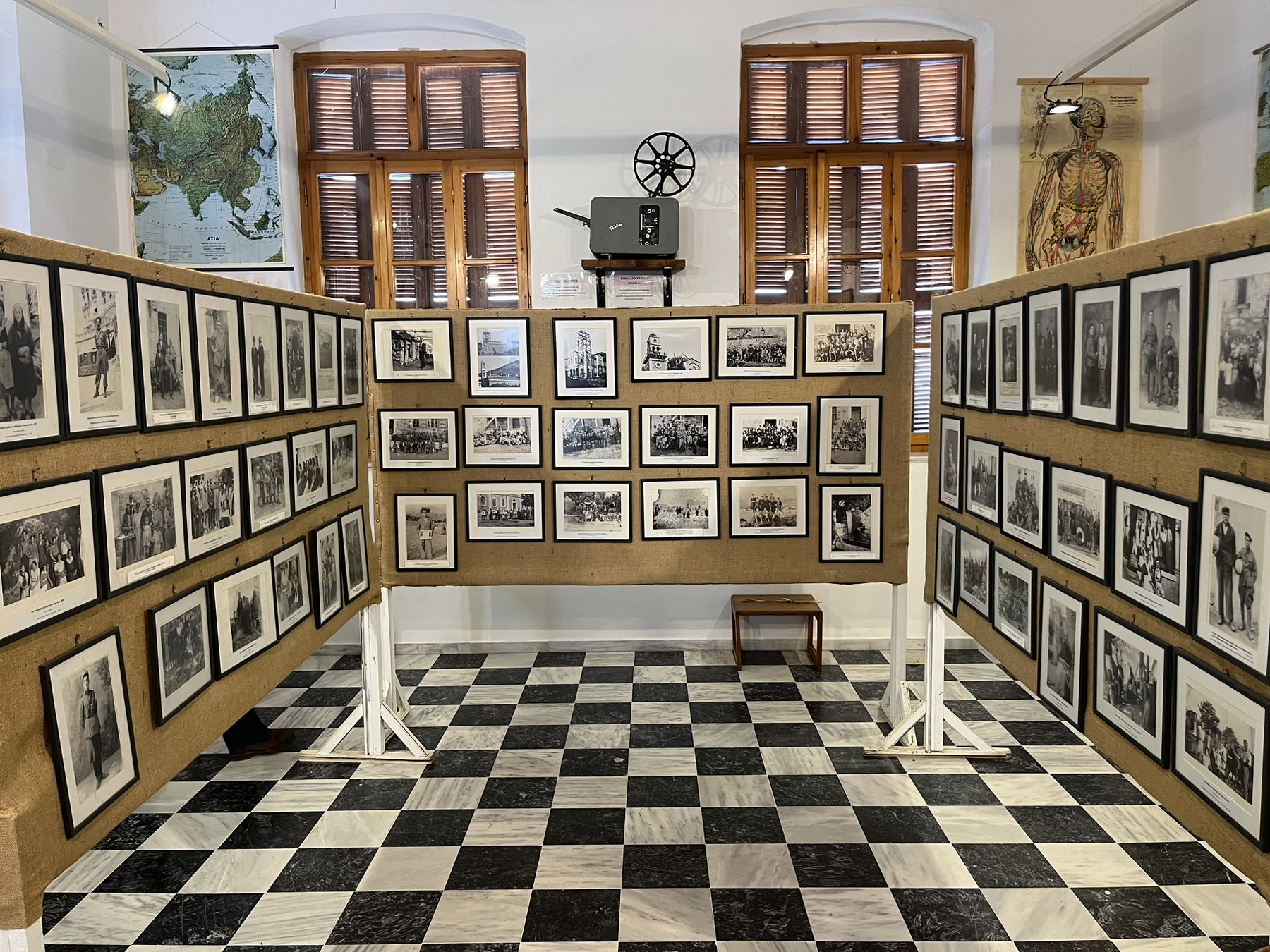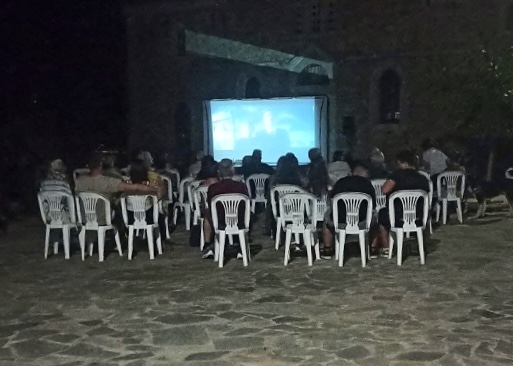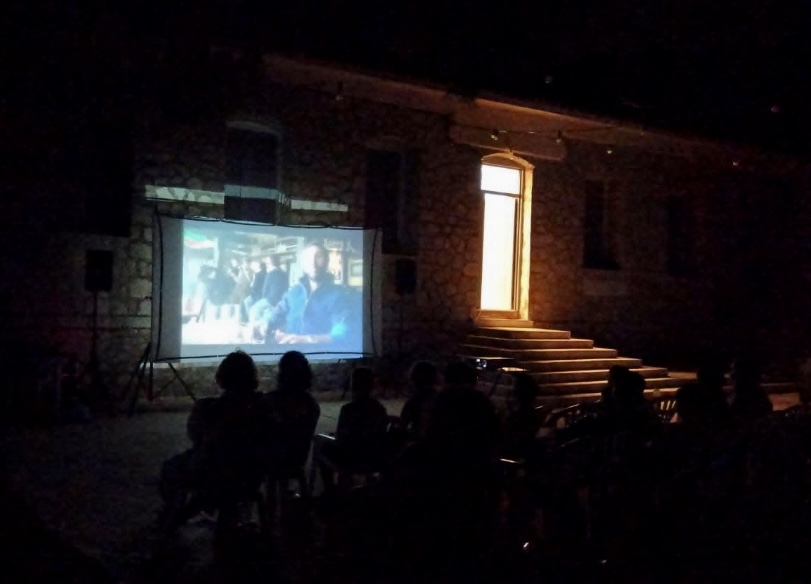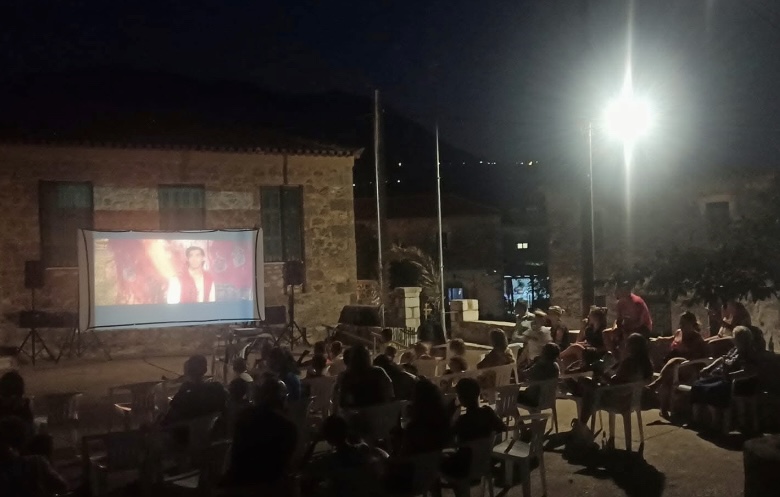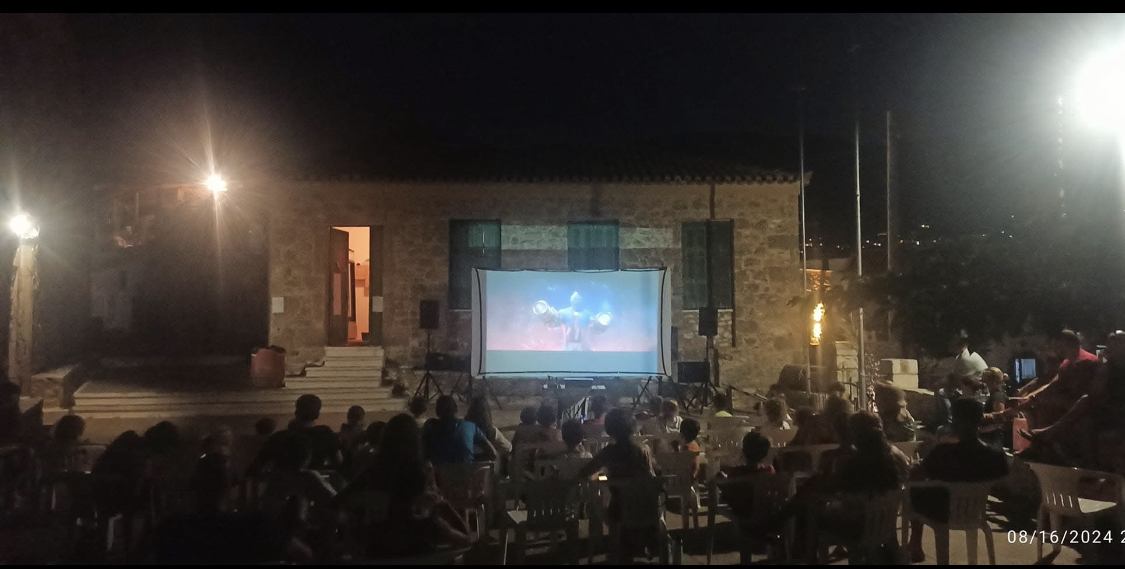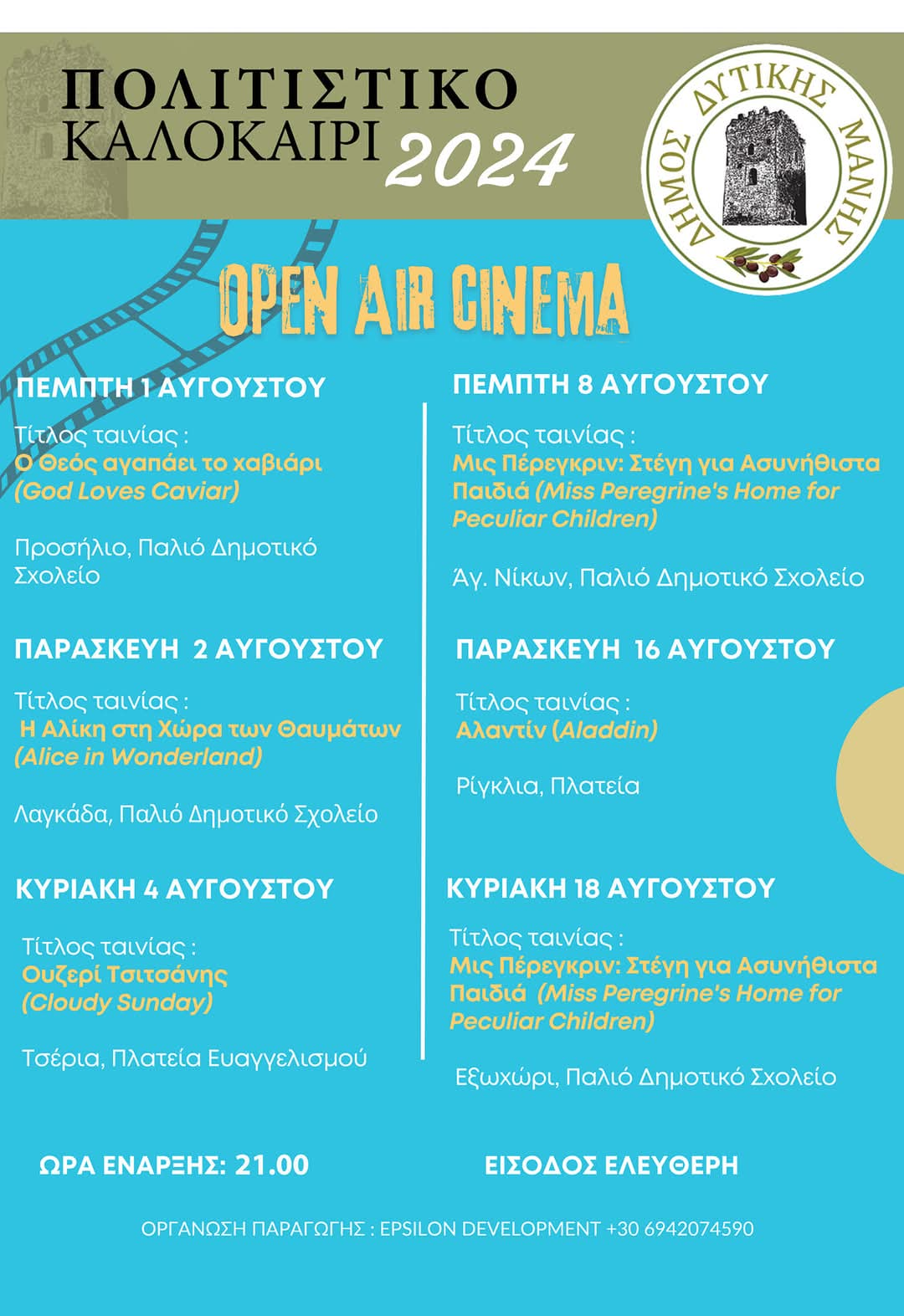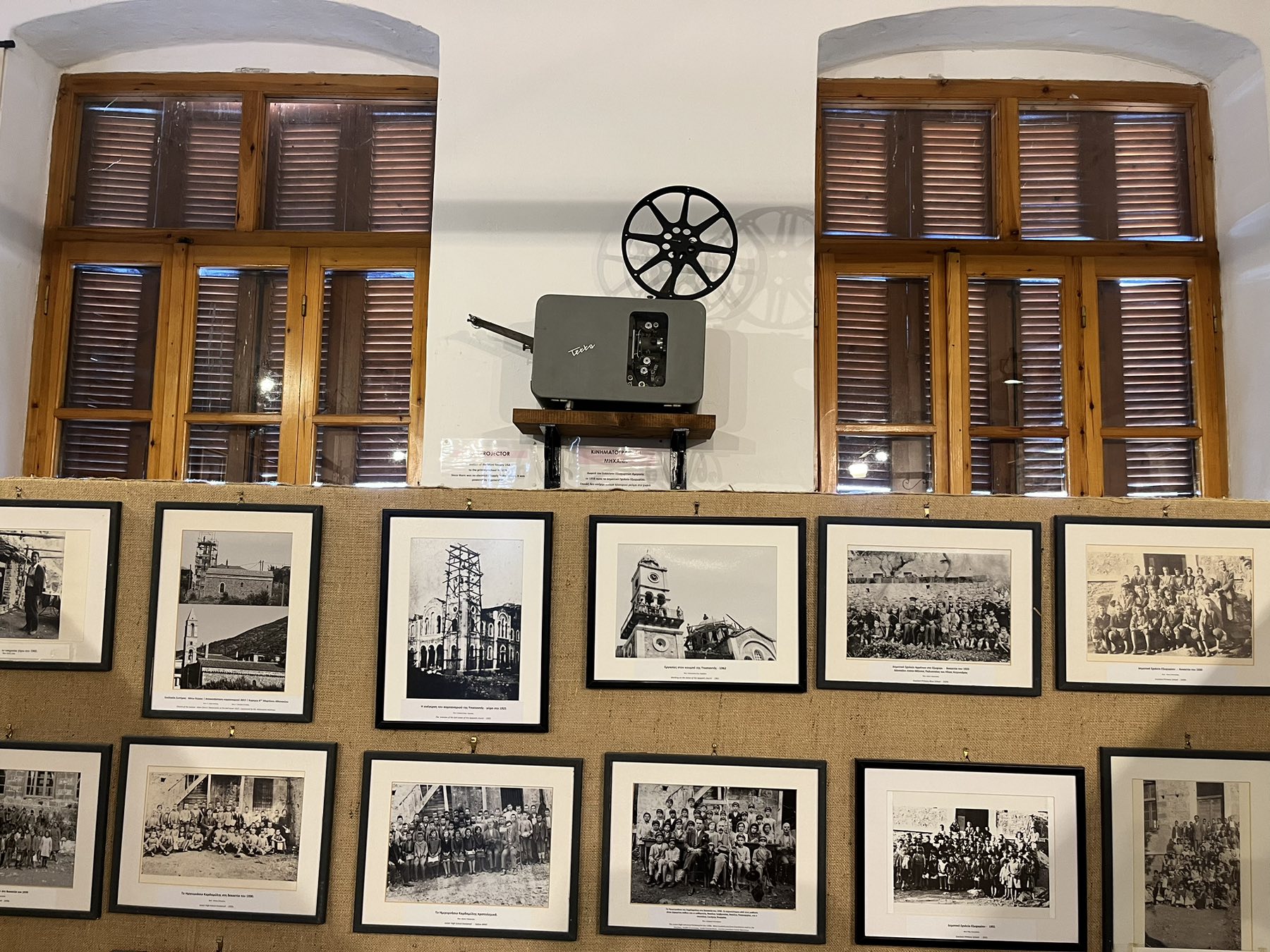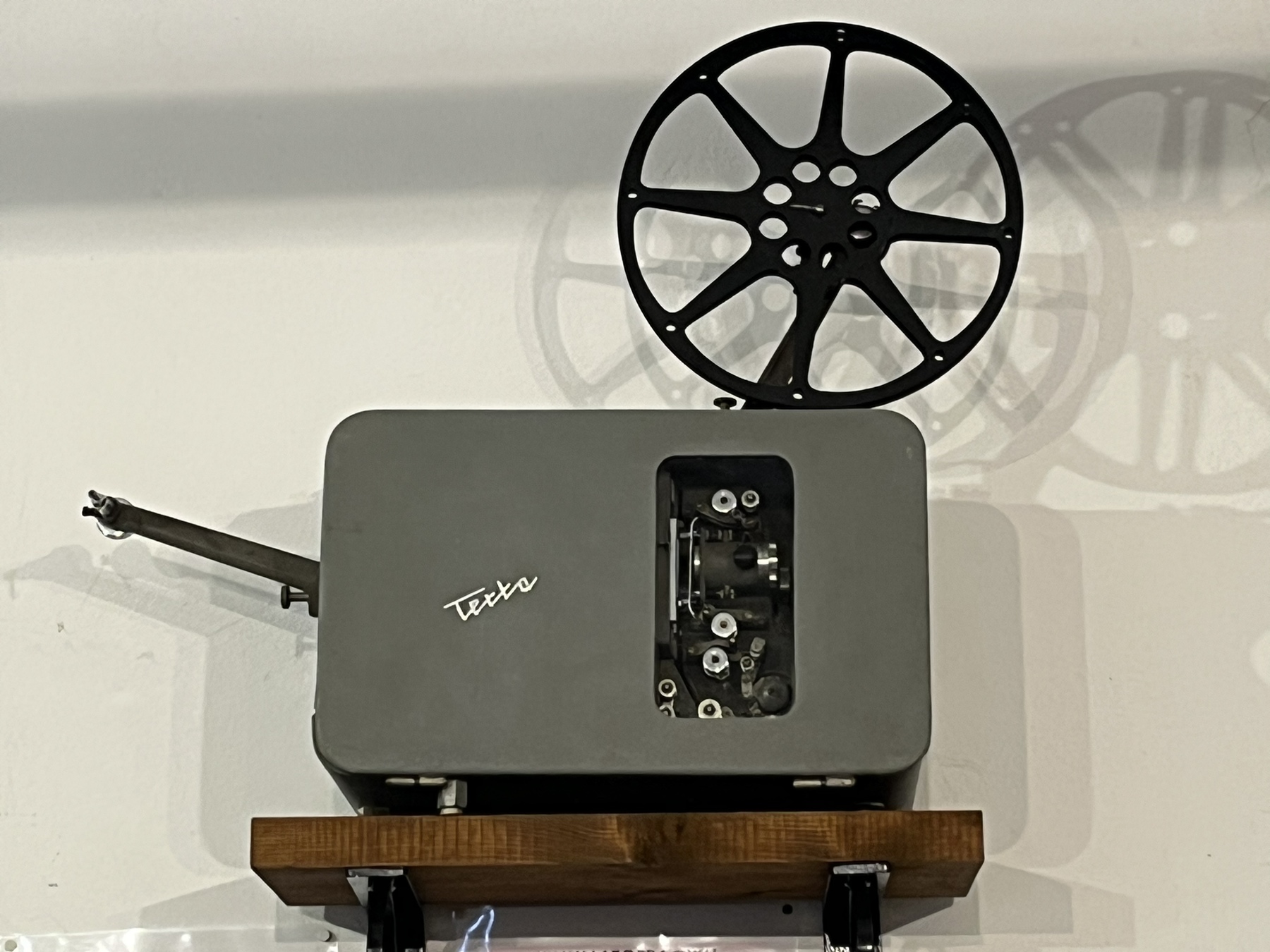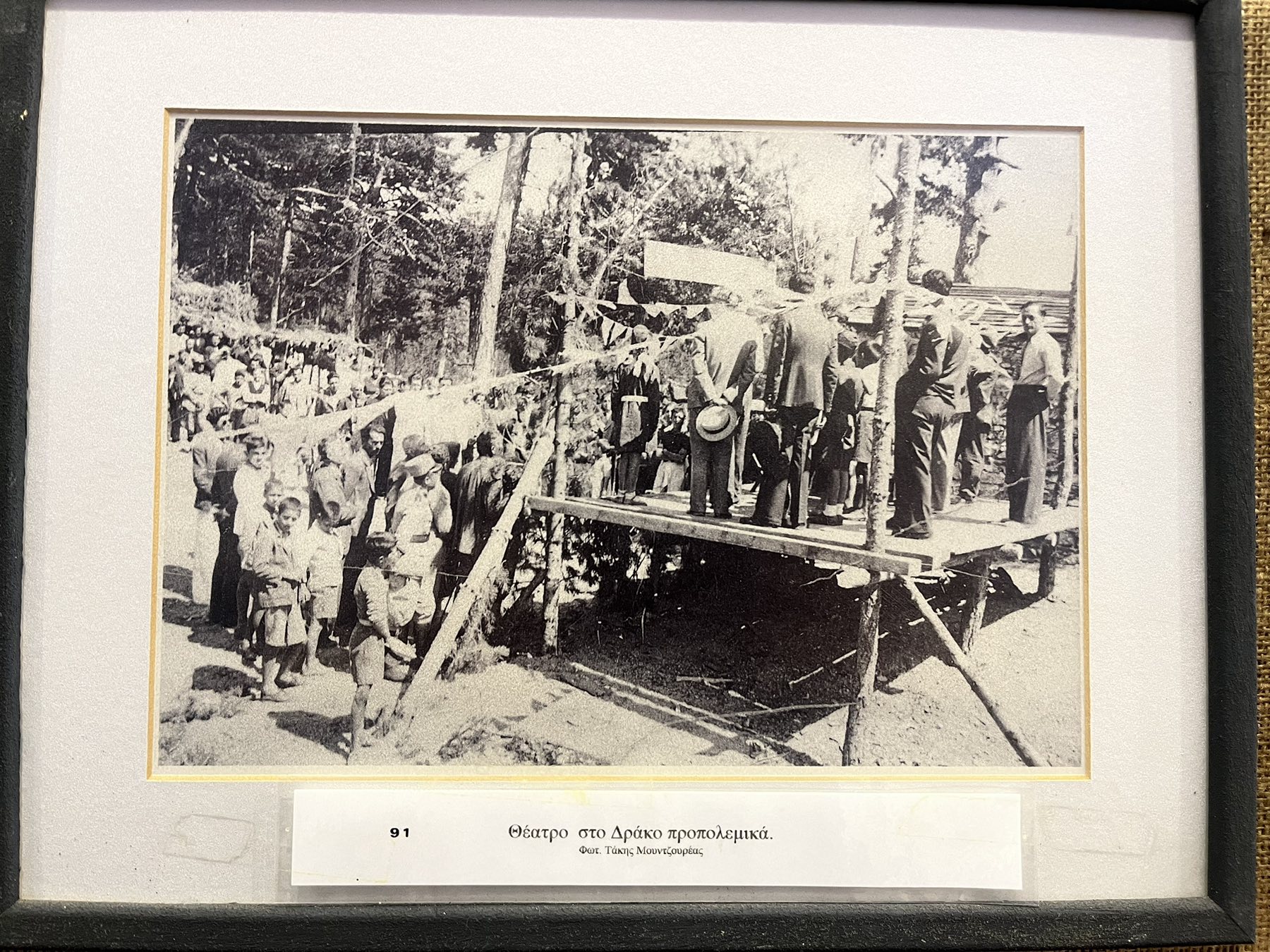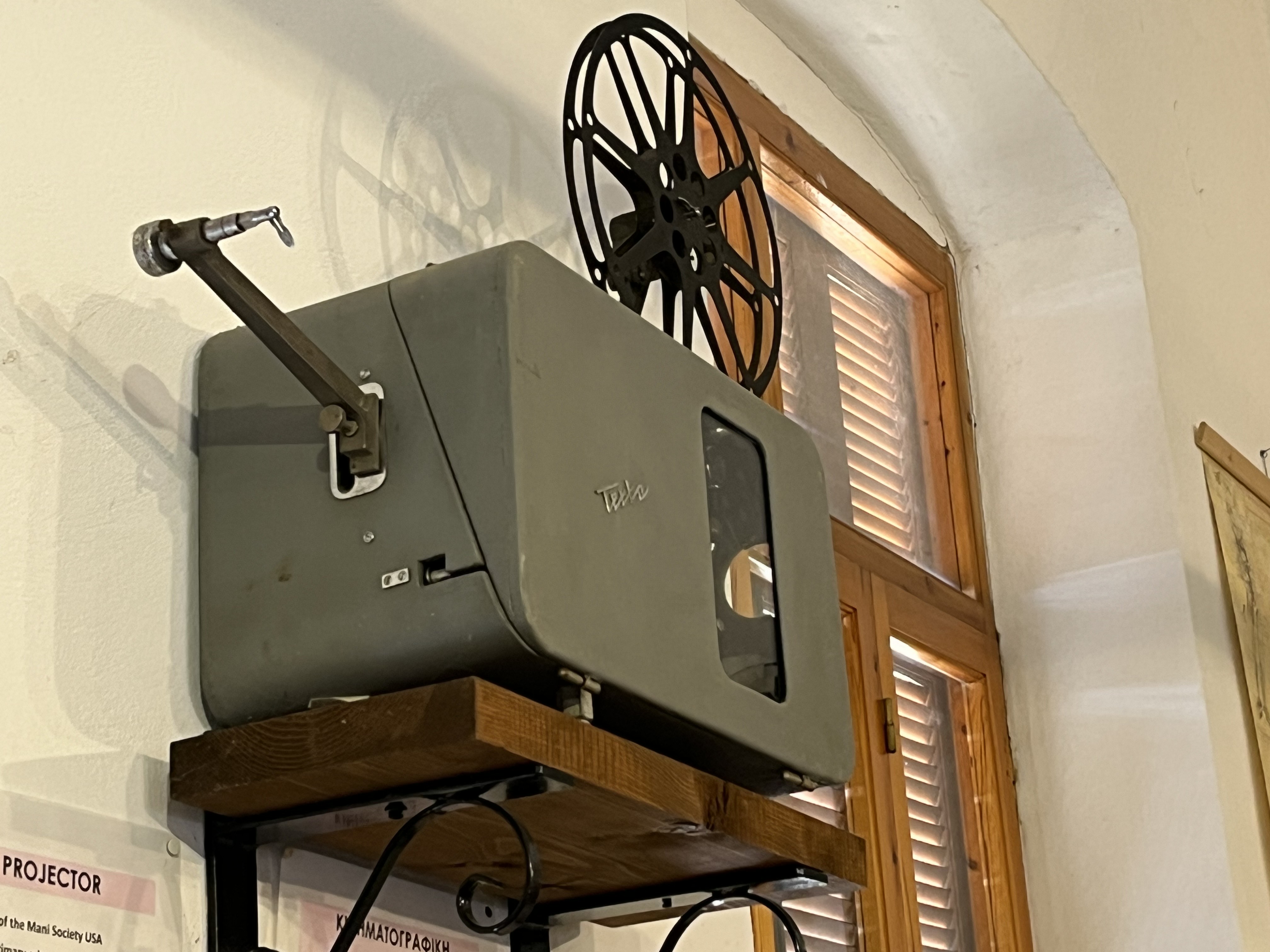Open Stage Mani
Open Stage Mani: Revival of theatrical performances and film screenings in the villages of Mani
"Open Stage Mani"! Experience open-air theatre & cinema in picturesque villages. A unique cultural journey. "Open Stage Mani" is a community-driven initiative making theatre and film accessible to all. From family-friendly films to thought-provoking plays, our program caters to diverse tastes and ages. Join us for an unforgettable experience, where shared moments connect us all. Support our mission to bring joy and cultural enrichment to every corner of Western Mani. Let the stories unfold!
Greece
{Empty}
Early initiative
Yes
Yes
Yes
No
No
44020104: Municipal Commune of Exochori (EL)
"Open Stage Mani" revitalizes Western Mani’s cultural scene by bringing back theatrical performances and film screenings, fostering community engagement and sustainable cultural tourism.
Core Values:
Sustainability: The project repurposes existing village spaces, minimizing environmental impact and new construction. By promoting local artists and businesses, it supports the regional economy and cultural preservation. Eco-friendly practices extend to waste management, energy use, and infrastructure materials, promoting sustainable tourism for residents and visitors.
Inclusivity: Cultural events are hosted in diverse village settings, fostering social cohesion and intergenerational dialogue. "Open Stage Mani" provides platforms for local artists and marginalized groups, ensuring broad community participation. Workshops and outreach programs encourage shared ownership, and accessibility for people with disabilities is a priority.
Beauty: The initiative enriches Mani’s cultural heritage through artistic performances and cinematic storytelling, enhancing village aesthetics and reinforcing local identity. Traditional art forms, locally crafted sets, and outdoor performances highlight the region’s artistic traditions and natural beauty.
Impact and Legacy:
"Open Stage Mani" exemplifies how cultural revival fosters sustainable development, inclusivity, and beauty. Its resource-efficient approach makes it a replicable model for other municipalities. Success will be measured through artistic achievements and their impact on the local economy, social cohesion, and environmental sustainability. The project aims to leave a lasting legacy, enriching lives and inspiring cultural heritage revitalization.
Core Values:
Sustainability: The project repurposes existing village spaces, minimizing environmental impact and new construction. By promoting local artists and businesses, it supports the regional economy and cultural preservation. Eco-friendly practices extend to waste management, energy use, and infrastructure materials, promoting sustainable tourism for residents and visitors.
Inclusivity: Cultural events are hosted in diverse village settings, fostering social cohesion and intergenerational dialogue. "Open Stage Mani" provides platforms for local artists and marginalized groups, ensuring broad community participation. Workshops and outreach programs encourage shared ownership, and accessibility for people with disabilities is a priority.
Beauty: The initiative enriches Mani’s cultural heritage through artistic performances and cinematic storytelling, enhancing village aesthetics and reinforcing local identity. Traditional art forms, locally crafted sets, and outdoor performances highlight the region’s artistic traditions and natural beauty.
Impact and Legacy:
"Open Stage Mani" exemplifies how cultural revival fosters sustainable development, inclusivity, and beauty. Its resource-efficient approach makes it a replicable model for other municipalities. Success will be measured through artistic achievements and their impact on the local economy, social cohesion, and environmental sustainability. The project aims to leave a lasting legacy, enriching lives and inspiring cultural heritage revitalization.
Sustainability
Inclusivity
Beauty
Cultural Revitalization
Community Engagement
Key Sustainability Objectives of "Open Stage Mani"
1. Minimizing Environmental Impact
"Open Stage Mani" repurposes existing village spaces for cultural events, reducing the need for new construction and preserving the natural landscape. By utilizing energy-efficient lighting, sustainable materials, and responsible waste management, the initiative ensures minimal environmental footprint. Outdoor performances further integrate culture with nature, promoting eco-conscious engagement.
2. Supporting Local Economy & Cultural Preservation
The initiative prioritizes local artists, craftspeople, and businesses, creating economic opportunities while preserving traditional arts. By showcasing local stories and heritage through theater and film, "Open Stage Mani" strengthens cultural identity and attracts responsible tourism that benefits the community long-term.
3. Promoting Sustainable Tourism
By integrating cultural activities into village life, the initiative fosters year-round, environmentally responsible tourism. Visitors engage with authentic Maniot traditions, reducing the impact of mass tourism while distributing economic benefits more evenly across the region.
4. Ensuring Long-Term Viability
Workshops and community involvement ensure that knowledge, skills, and cultural appreciation are passed down across generations. The initiative’s adaptable model encourages ongoing engagement and expansion while maintaining sustainability principles.
Exemplary Impact
"Open Stage Mani" serves as a model for other regions seeking to balance cultural revival with sustainability. Its use of existing resources, community-driven approach, and commitment to ecological responsibility demonstrate how cultural heritage can be a catalyst for sustainable development. By fostering local talent and green tourism, the initiative creates a lasting, scalable impact that can inspire similar projects worldwide.
1. Minimizing Environmental Impact
"Open Stage Mani" repurposes existing village spaces for cultural events, reducing the need for new construction and preserving the natural landscape. By utilizing energy-efficient lighting, sustainable materials, and responsible waste management, the initiative ensures minimal environmental footprint. Outdoor performances further integrate culture with nature, promoting eco-conscious engagement.
2. Supporting Local Economy & Cultural Preservation
The initiative prioritizes local artists, craftspeople, and businesses, creating economic opportunities while preserving traditional arts. By showcasing local stories and heritage through theater and film, "Open Stage Mani" strengthens cultural identity and attracts responsible tourism that benefits the community long-term.
3. Promoting Sustainable Tourism
By integrating cultural activities into village life, the initiative fosters year-round, environmentally responsible tourism. Visitors engage with authentic Maniot traditions, reducing the impact of mass tourism while distributing economic benefits more evenly across the region.
4. Ensuring Long-Term Viability
Workshops and community involvement ensure that knowledge, skills, and cultural appreciation are passed down across generations. The initiative’s adaptable model encourages ongoing engagement and expansion while maintaining sustainability principles.
Exemplary Impact
"Open Stage Mani" serves as a model for other regions seeking to balance cultural revival with sustainability. Its use of existing resources, community-driven approach, and commitment to ecological responsibility demonstrate how cultural heritage can be a catalyst for sustainable development. By fostering local talent and green tourism, the initiative creates a lasting, scalable impact that can inspire similar projects worldwide.
Enhancing Aesthetics & Experience through "Open Stage Mani"
1. Thoughtful Design
The initiative repurposes existing village spaces for performances, preserving their unique character while enhancing functionality. Respecting architectural heritage, it transforms venues into inviting cultural hubs. Locally crafted sets and costumes add authenticity, blending tradition with artistic innovation.
2. Fostering Positive Emotions
By reviving traditional art forms and storytelling, "Open Stage Mani" instills pride and strengthens community bonds. Shared cultural experiences create lasting memories for both residents and visitors. The accessible nature of events ensures inclusivity, allowing everyone to engage and enjoy.
3. Cultural Enrichment & Identity
Showcasing local talent and celebrating Western Mani’s history reinforces cultural heritage for future generations. The initiative serves as a platform for artistic expression, encouraging intercultural dialogue and deepening the region’s cultural landscape. Strengthening local identity, it fosters a profound sense of place.
A Model for Cultural Revival
"Open Stage Mani" exemplifies how cultural initiatives can enhance aesthetics and experience by prioritizing community engagement, heritage preservation, and artistic celebration. Its accessible, inclusive approach makes it a replicable model for communities looking to enrich their cultural offerings and promote sustainable tourism. By combining stunning settings, engaging performances, and strong community spirit, it delivers a truly memorable and meaningful experience for all.
1. Thoughtful Design
The initiative repurposes existing village spaces for performances, preserving their unique character while enhancing functionality. Respecting architectural heritage, it transforms venues into inviting cultural hubs. Locally crafted sets and costumes add authenticity, blending tradition with artistic innovation.
2. Fostering Positive Emotions
By reviving traditional art forms and storytelling, "Open Stage Mani" instills pride and strengthens community bonds. Shared cultural experiences create lasting memories for both residents and visitors. The accessible nature of events ensures inclusivity, allowing everyone to engage and enjoy.
3. Cultural Enrichment & Identity
Showcasing local talent and celebrating Western Mani’s history reinforces cultural heritage for future generations. The initiative serves as a platform for artistic expression, encouraging intercultural dialogue and deepening the region’s cultural landscape. Strengthening local identity, it fosters a profound sense of place.
A Model for Cultural Revival
"Open Stage Mani" exemplifies how cultural initiatives can enhance aesthetics and experience by prioritizing community engagement, heritage preservation, and artistic celebration. Its accessible, inclusive approach makes it a replicable model for communities looking to enrich their cultural offerings and promote sustainable tourism. By combining stunning settings, engaging performances, and strong community spirit, it delivers a truly memorable and meaningful experience for all.
"Open Stage Mani" prioritizes inclusion through:
1.Accessibility: Events are held in accessible village spaces, catering to diverse needs, including people with disabilities. Information about performances is widely disseminated, ensuring everyone can participate.
2.Affordability: Performances and screenings are free, making them accessible to all residents, regardless of income. This removes financial barriers to cultural participation.
3.Inclusive Governing Systems: The initiative encourages community involvement in planning and decision-making, ensuring the project reflects local needs and priorities. Collaboration with local stakeholders fosters a sense of shared ownership.
4. Design for All: Performance spaces are designed to be inclusive and welcoming to all community members, respecting diverse backgrounds and abilities. The selection of performances reflects the diverse interests of the community.
5. New Societal Models: By fostering intergenerational dialogue and social cohesion, "Open Stage Mani" contributes to building stronger and more inclusive communities. It creates opportunities for shared experiences, promoting understanding and respect among different groups.
Exemplary in its approach, "Open Stage Mani" demonstrates how cultural initiatives can prioritize inclusion by focusing on accessibility, affordability, community engagement, and design for all principles. Its commitment to creating opportunities for everyone to participate and benefit makes it a replicable model for other communities seeking to foster social cohesion and build more inclusive societies. By celebrating diversity and promoting cultural exchange, "Open Stage Mani" creates a welcoming and enriching environment for all.
1.Accessibility: Events are held in accessible village spaces, catering to diverse needs, including people with disabilities. Information about performances is widely disseminated, ensuring everyone can participate.
2.Affordability: Performances and screenings are free, making them accessible to all residents, regardless of income. This removes financial barriers to cultural participation.
3.Inclusive Governing Systems: The initiative encourages community involvement in planning and decision-making, ensuring the project reflects local needs and priorities. Collaboration with local stakeholders fosters a sense of shared ownership.
4. Design for All: Performance spaces are designed to be inclusive and welcoming to all community members, respecting diverse backgrounds and abilities. The selection of performances reflects the diverse interests of the community.
5. New Societal Models: By fostering intergenerational dialogue and social cohesion, "Open Stage Mani" contributes to building stronger and more inclusive communities. It creates opportunities for shared experiences, promoting understanding and respect among different groups.
Exemplary in its approach, "Open Stage Mani" demonstrates how cultural initiatives can prioritize inclusion by focusing on accessibility, affordability, community engagement, and design for all principles. Its commitment to creating opportunities for everyone to participate and benefit makes it a replicable model for other communities seeking to foster social cohesion and build more inclusive societies. By celebrating diversity and promoting cultural exchange, "Open Stage Mani" creates a welcoming and enriching environment for all.
Community & Civil Society Engagement in "Open Stage Mani"
1. Active Involvement
From planning to execution, community members play a key role in shaping the initiative. Residents help select performances, suggest venues, and even participate as performers. Cultural associations and civil society organizations collaborate on event organization and promotion. Open forums and workshops ensure continuous community input.
2. Meaningful Impact
By reflecting local needs and preferences, the initiative fosters strong community ownership, leading to higher participation and support. Collaboration with civil society groups expands its reach and impact, while citizen feedback helps refine and adapt the project. "Open Stage Mani" empowers residents, strengthening local networks and building community capacity.
A Model for Community-Led Cultural Development
"Open Stage Mani" exemplifies how citizen and civil society involvement enhances cultural initiatives. By placing the community at its core, it fosters belonging, preserves cultural heritage, and ensures long-term sustainability. This participatory model serves as a blueprint for other initiatives aiming to empower communities and promote cultural development.
1. Active Involvement
From planning to execution, community members play a key role in shaping the initiative. Residents help select performances, suggest venues, and even participate as performers. Cultural associations and civil society organizations collaborate on event organization and promotion. Open forums and workshops ensure continuous community input.
2. Meaningful Impact
By reflecting local needs and preferences, the initiative fosters strong community ownership, leading to higher participation and support. Collaboration with civil society groups expands its reach and impact, while citizen feedback helps refine and adapt the project. "Open Stage Mani" empowers residents, strengthening local networks and building community capacity.
A Model for Community-Led Cultural Development
"Open Stage Mani" exemplifies how citizen and civil society involvement enhances cultural initiatives. By placing the community at its core, it fosters belonging, preserves cultural heritage, and ensures long-term sustainability. This participatory model serves as a blueprint for other initiatives aiming to empower communities and promote cultural development.
Stakeholder Engagement in "Open Stage Mani" – Municipality of West Mani
1. Local Level (West Mani Municipality & Community)
Residents, local artists, and businesses actively participate in planning, performance selection, and venue preparation, ensuring the initiative meets community needs.
Village councils provide logistical support and venue access, helping to integrate performances into the fabric of local life.
Cultural associations and schools collaborate on workshops, outreach programs, and heritage preservation activities.
Local businesses (hotels, restaurants, and artisans) benefit from increased cultural tourism, fostering economic sustainability.
2. Regional Level (Peloponnese Region & Tourism Sector)
The Region of Peloponnese and the Regional Tourism Board promote "Open Stage Mani" within broader cultural and tourism strategies, increasing regional visibility.
Regional cultural organizations contribute expertise, networking opportunities, and promotional support.
Collaboration with nearby municipalities creates synergies for shared events and expanded audience engagement.
3. National Level (Greek Cultural Institutions & Funding Bodies)
The Greek Ministry of Culture is approached for funding, recognition, and integration into national cultural heritage programs.
National funding agencies support infrastructure improvements and artistic development.
Partnerships with national theater and film organizations bring expertise, professional guidance, and performance exchanges.
4. European Level (New European Bauhaus & Cultural Networks)
The initiative aligns with New European Bauhaus (NEB) values, exploring funding opportunities and potential recognition within European cultural frameworks.
EU cultural programs (e.g., Creative Europe, Interreg, and Erasmus+) offer collaboration, knowledge exchange, and capacity-building opportunities.
Networking with similar European projects fosters best practice sharing and strengthens international visibility
1. Local Level (West Mani Municipality & Community)
Residents, local artists, and businesses actively participate in planning, performance selection, and venue preparation, ensuring the initiative meets community needs.
Village councils provide logistical support and venue access, helping to integrate performances into the fabric of local life.
Cultural associations and schools collaborate on workshops, outreach programs, and heritage preservation activities.
Local businesses (hotels, restaurants, and artisans) benefit from increased cultural tourism, fostering economic sustainability.
2. Regional Level (Peloponnese Region & Tourism Sector)
The Region of Peloponnese and the Regional Tourism Board promote "Open Stage Mani" within broader cultural and tourism strategies, increasing regional visibility.
Regional cultural organizations contribute expertise, networking opportunities, and promotional support.
Collaboration with nearby municipalities creates synergies for shared events and expanded audience engagement.
3. National Level (Greek Cultural Institutions & Funding Bodies)
The Greek Ministry of Culture is approached for funding, recognition, and integration into national cultural heritage programs.
National funding agencies support infrastructure improvements and artistic development.
Partnerships with national theater and film organizations bring expertise, professional guidance, and performance exchanges.
4. European Level (New European Bauhaus & Cultural Networks)
The initiative aligns with New European Bauhaus (NEB) values, exploring funding opportunities and potential recognition within European cultural frameworks.
EU cultural programs (e.g., Creative Europe, Interreg, and Erasmus+) offer collaboration, knowledge exchange, and capacity-building opportunities.
Networking with similar European projects fosters best practice sharing and strengthens international visibility
"Open Stage Mani" integrates diverse disciplines:
Arts & Culture: Theatre, film, music, and visual arts professionals contribute to performance quality and artistic direction. Cultural heritage experts advise on preserving local traditions.
Tourism & Hospitality: Tourism professionals contribute to marketing and promotion, ensuring sustainable tourism practices. Hospitality businesses benefit from increased visitor traffic.
Community Development: Community organizers facilitate citizen engagement and ensure the project reflects local needs. Social workers contribute to inclusivity and accessibility.
Architecture & Design: Architects and designers advise on adapting existing spaces for performances, respecting heritage and enhancing functionality.
Environmental Sustainability: Experts on sustainability advise on minimizing environmental impact through responsible resource use and waste management.
Interaction: Representatives from these fields collaborate through workshops, meetings, and consultations. This interdisciplinary approach ensures a holistic and well-rounded initiative.
Added Value: Combining diverse expertise enriches the project's design and implementation. It leads to more creative solutions, enhances cultural authenticity, ensures sustainability, and maximizes community benefit. This collaborative process fosters innovation and strengthens local capacity for future initiatives. It creates a synergy where the whole is greater than the sum of its parts.
Arts & Culture: Theatre, film, music, and visual arts professionals contribute to performance quality and artistic direction. Cultural heritage experts advise on preserving local traditions.
Tourism & Hospitality: Tourism professionals contribute to marketing and promotion, ensuring sustainable tourism practices. Hospitality businesses benefit from increased visitor traffic.
Community Development: Community organizers facilitate citizen engagement and ensure the project reflects local needs. Social workers contribute to inclusivity and accessibility.
Architecture & Design: Architects and designers advise on adapting existing spaces for performances, respecting heritage and enhancing functionality.
Environmental Sustainability: Experts on sustainability advise on minimizing environmental impact through responsible resource use and waste management.
Interaction: Representatives from these fields collaborate through workshops, meetings, and consultations. This interdisciplinary approach ensures a holistic and well-rounded initiative.
Added Value: Combining diverse expertise enriches the project's design and implementation. It leads to more creative solutions, enhances cultural authenticity, ensures sustainability, and maximizes community benefit. This collaborative process fosters innovation and strengthens local capacity for future initiatives. It creates a synergy where the whole is greater than the sum of its parts.
"Open Stage Mani" redefines cultural initiatives by introducing a community-driven, sustainable, and decentralized approach that sets it apart from conventional models.
• Decentralized Access: Unlike centralized urban venues, the initiative brings performances to villages, making arts and culture accessible to rural communities that are often underserved.
• Community-Led Programming: Instead of a top-down approach, the program is shaped by local input, ensuring greater community ownership and cultural relevance.
• Immersive Open-Air Experiences: Utilizing Mani’s natural beauty, the initiative transforms village squares and historic sites into performance spaces, creating unique, site-specific cultural experiences beyond traditional halls and cinemas.
• Intergenerational Engagement: Unlike many cultural projects targeting specific demographics, "Open Stage Mani" fosters connections across generations, strengthening social bonds through shared artistic experiences.
• Empowering Local Talent: Prioritizing regional artists and filmmakers over established mainstream figures helps cultivate a vibrant local arts scene, fostering sustainable cultural development.
• Sustainable Tourism & Regional Revitalization: Instead of promoting mass tourism, the initiative attracts visitors for authentic cultural experiences, supporting local businesses and preserving Western Mani’s heritage.
By blending cultural heritage with innovation, community participation, and sustainability, "Open Stage Mani" creates an inclusive and eco-conscious cultural model that stands apart from conventional initiatives.
"Open Stage Mani" builds community, celebrates local talent, and creates accessible, inclusive, and eco-conscious cultural experiences in Western Mani, a holistic, community-centered approach distinguishing it from mainstream initiatives.
• Decentralized Access: Unlike centralized urban venues, the initiative brings performances to villages, making arts and culture accessible to rural communities that are often underserved.
• Community-Led Programming: Instead of a top-down approach, the program is shaped by local input, ensuring greater community ownership and cultural relevance.
• Immersive Open-Air Experiences: Utilizing Mani’s natural beauty, the initiative transforms village squares and historic sites into performance spaces, creating unique, site-specific cultural experiences beyond traditional halls and cinemas.
• Intergenerational Engagement: Unlike many cultural projects targeting specific demographics, "Open Stage Mani" fosters connections across generations, strengthening social bonds through shared artistic experiences.
• Empowering Local Talent: Prioritizing regional artists and filmmakers over established mainstream figures helps cultivate a vibrant local arts scene, fostering sustainable cultural development.
• Sustainable Tourism & Regional Revitalization: Instead of promoting mass tourism, the initiative attracts visitors for authentic cultural experiences, supporting local businesses and preserving Western Mani’s heritage.
By blending cultural heritage with innovation, community participation, and sustainability, "Open Stage Mani" creates an inclusive and eco-conscious cultural model that stands apart from conventional initiatives.
"Open Stage Mani" builds community, celebrates local talent, and creates accessible, inclusive, and eco-conscious cultural experiences in Western Mani, a holistic, community-centered approach distinguishing it from mainstream initiatives.
Open Stage Mani employs a community-centric methodology, prioritizing participation and local ownership.
1.Community Engagement: We begin with extensive dialogue with residents, understanding their cultural preferences and needs through surveys, focus groups, and village meetings. This process shapes program selection and ensures relevance.
2.Collaborative Partnerships: We build strong relationships with local artists, filmmakers, community organizations, and businesses. These partnerships are crucial for talent sourcing and venue identification.
3.Open Call for Artists: We issue open calls for submissions, encouraging local artists and filmmakers to showcase their work. A diverse selection committee, including community representatives, reviews submissions, ensuring inclusivity and artistic merit.
4.Site-Specific Adaptations: We carefully assess potential open-air venues in each village, adapting performances and screenings to the unique characteristics of each space. This site-specific approach enhances artistic experience and respects the local environment.
5.Accessibility Focus: We prioritize accessibility in all aspects of our programming, from venue selection and ticket pricing to marketing and outreach. We aim to remove barriers to participation and ensure everyone can enjoy the events.
6.Sustainable Practices: We integrate sustainable practices throughout our operations, minimizing environmental impact through responsible waste management, use of local resources, and promotion of eco-friendly transportation.
7.Ongoing Evaluation: We continuously evaluate our programs through audience feedback and data collection, adapting our approach based on learnings and ensuring long-term sustainability and community impact.
"Open Stage Mani"'s methodology emphasizes collaboration, inclusivity, and sustainability, ensuring the initiative is deeply rooted in the community and contributes to the long-term cultural and economic well-being of Western Mani.
1.Community Engagement: We begin with extensive dialogue with residents, understanding their cultural preferences and needs through surveys, focus groups, and village meetings. This process shapes program selection and ensures relevance.
2.Collaborative Partnerships: We build strong relationships with local artists, filmmakers, community organizations, and businesses. These partnerships are crucial for talent sourcing and venue identification.
3.Open Call for Artists: We issue open calls for submissions, encouraging local artists and filmmakers to showcase their work. A diverse selection committee, including community representatives, reviews submissions, ensuring inclusivity and artistic merit.
4.Site-Specific Adaptations: We carefully assess potential open-air venues in each village, adapting performances and screenings to the unique characteristics of each space. This site-specific approach enhances artistic experience and respects the local environment.
5.Accessibility Focus: We prioritize accessibility in all aspects of our programming, from venue selection and ticket pricing to marketing and outreach. We aim to remove barriers to participation and ensure everyone can enjoy the events.
6.Sustainable Practices: We integrate sustainable practices throughout our operations, minimizing environmental impact through responsible waste management, use of local resources, and promotion of eco-friendly transportation.
7.Ongoing Evaluation: We continuously evaluate our programs through audience feedback and data collection, adapting our approach based on learnings and ensuring long-term sustainability and community impact.
"Open Stage Mani"'s methodology emphasizes collaboration, inclusivity, and sustainability, ensuring the initiative is deeply rooted in the community and contributes to the long-term cultural and economic well-being of Western Mani.
Replicable & Transferable Elements of "Open Stage Mani"
"Open Stage Mani" offers a flexible, community-centered model that can be adapted to different places, beneficiaries, and contexts. Key transferable elements include:
• Community-Driven Methodology: The participatory approach—using surveys, focus groups, and partnerships—ensures cultural programs align with local needs. This method can be applied anywhere to foster community ownership.
• Open Call for Artists: An open selection process with diverse juries helps uncover and promote local talent in any region, encouraging artistic expression and community pride.
• Site-Specific Performances: Adapting events to local landscapes, historic sites, or public spaces enhances artistic impact and can be implemented in both urban and rural settings.
• Accessibility & Inclusion: Ensuring affordability, diverse venue selection, and targeted outreach makes cultural initiatives inclusive. Removing barriers to participation is a universally adaptable strategy.
• Intergenerational Programming: Engaging different age groups strengthens social bonds and cultural continuity, making it a valuable model for fostering intergenerational dialogue anywhere.
• Collaborative Partnerships: Strong networks with local organizations, businesses, and artists create sustainable support systems—an approach transferable to any cultural initiative.
• Focus on Local Talent: Prioritizing regional artists nurtures local arts scenes and cultural heritage, a model applicable to any community looking to strengthen its creative sector.
• Open-Air Cultural Experiences: Utilizing outdoor spaces for performances offers flexible, immersive events that can be adapted to various geographic and climatic conditions.
By emphasizing these elements, "Open Stage Mani" provides a blueprint for other communities to develop inclusive, sustainable, and site-specific cultural programs tailored to their own contexts.
"Open Stage Mani" offers a flexible, community-centered model that can be adapted to different places, beneficiaries, and contexts. Key transferable elements include:
• Community-Driven Methodology: The participatory approach—using surveys, focus groups, and partnerships—ensures cultural programs align with local needs. This method can be applied anywhere to foster community ownership.
• Open Call for Artists: An open selection process with diverse juries helps uncover and promote local talent in any region, encouraging artistic expression and community pride.
• Site-Specific Performances: Adapting events to local landscapes, historic sites, or public spaces enhances artistic impact and can be implemented in both urban and rural settings.
• Accessibility & Inclusion: Ensuring affordability, diverse venue selection, and targeted outreach makes cultural initiatives inclusive. Removing barriers to participation is a universally adaptable strategy.
• Intergenerational Programming: Engaging different age groups strengthens social bonds and cultural continuity, making it a valuable model for fostering intergenerational dialogue anywhere.
• Collaborative Partnerships: Strong networks with local organizations, businesses, and artists create sustainable support systems—an approach transferable to any cultural initiative.
• Focus on Local Talent: Prioritizing regional artists nurtures local arts scenes and cultural heritage, a model applicable to any community looking to strengthen its creative sector.
• Open-Air Cultural Experiences: Utilizing outdoor spaces for performances offers flexible, immersive events that can be adapted to various geographic and climatic conditions.
By emphasizing these elements, "Open Stage Mani" provides a blueprint for other communities to develop inclusive, sustainable, and site-specific cultural programs tailored to their own contexts.
"Open Stage Mani" responds to pressing global issues by implementing targeted, community-driven solutions in Western Mani:
• Cultural Access Inequality: Rural areas worldwide face limited access to arts and culture. By decentralizing performances and cultural events, "Open Stage Mani" ensures that even remote communities can engage with artistic expression.
• Community Fragmentation: Modern societies struggle with social isolation and weakening community ties. This initiative fosters social cohesion by creating shared cultural experiences that bring people together.
• Economic Disparity & Mass Tourism: Many regions suffer from economic imbalances and the negative effects of unsustainable tourism. By promoting local talent and businesses, "Open Stage Mani" supports a more equitable and sustainable local economy.
• Environmental Degradation: The initiative prioritizes sustainable practices—such as using existing village spaces, minimizing resource consumption, and promoting responsible tourism—helping to mitigate environmental impact.
• Loss of Cultural Heritage: Globalization often leads to cultural homogenization. By reviving local traditions, storytelling, and artistic heritage, the initiative helps preserve the unique identity of Western Mani.
• Intergenerational Disconnect: Many societies face a growing gap between generations. "Open Stage Mani" bridges this divide by creating cultural experiences that engage and connect people of all ages.
By tackling these global challenges at a local level, "Open Stage Mani" demonstrates how community-driven cultural initiatives can foster inclusivity, sustainability, and resilience—serving as a model for other regions facing similar issues."Open Stage Mani" can offer tangible solutions to complex global challenges, promoting cultural equity, social cohesion, economic sustainability, and environmental responsibility.
• Cultural Access Inequality: Rural areas worldwide face limited access to arts and culture. By decentralizing performances and cultural events, "Open Stage Mani" ensures that even remote communities can engage with artistic expression.
• Community Fragmentation: Modern societies struggle with social isolation and weakening community ties. This initiative fosters social cohesion by creating shared cultural experiences that bring people together.
• Economic Disparity & Mass Tourism: Many regions suffer from economic imbalances and the negative effects of unsustainable tourism. By promoting local talent and businesses, "Open Stage Mani" supports a more equitable and sustainable local economy.
• Environmental Degradation: The initiative prioritizes sustainable practices—such as using existing village spaces, minimizing resource consumption, and promoting responsible tourism—helping to mitigate environmental impact.
• Loss of Cultural Heritage: Globalization often leads to cultural homogenization. By reviving local traditions, storytelling, and artistic heritage, the initiative helps preserve the unique identity of Western Mani.
• Intergenerational Disconnect: Many societies face a growing gap between generations. "Open Stage Mani" bridges this divide by creating cultural experiences that engage and connect people of all ages.
By tackling these global challenges at a local level, "Open Stage Mani" demonstrates how community-driven cultural initiatives can foster inclusivity, sustainability, and resilience—serving as a model for other regions facing similar issues."Open Stage Mani" can offer tangible solutions to complex global challenges, promoting cultural equity, social cohesion, economic sustainability, and environmental responsibility.
"Open Stage Mani" is evolving with these activities:
• Expanding Reach: We'll extend programming to more villages, deepening community engagement and impact.
• Developing Educational Programs: Workshops and masterclasses led by artists will empower local talent and foster cultural participation.
• Creating Digital Content: Streaming performances and creating online resources will broaden accessibility and preserve cultural heritage.
• Building Partnerships: Collaborations with regional and national arts organizations will enhance artistic quality and visibility.
• Securing Sustainable Funding: Exploring diverse funding streams will ensure long-term viability and impact.
NEB Integration So Far:
• Beautiful: Open-air venues enhance existing village aesthetics, creating inspiring spaces for performance.
• Sustainable: Eco-friendly practices are integral, minimizing environmental impact and promoting responsible tourism.
• Inclusive: Community-driven programming ensures accessibility for all ages and backgrounds, fostering social cohesion.
Future NEB Steps:
• Co-creation: Deepening community involvement in program design and implementation through participatory workshops.
• Value-driven: Prioritizing social impact and cultural enrichment alongside economic benefits.
• Multidisciplinary: Exploring collaborations with architects and designers to enhance venue design and accessibility.
• Contextual: Adapting programs to the specific needs and cultural context of each village.
• Beautiful, Sustainable, Inclusive: Continuously striving to create beautiful and functional spaces, implement sustainable practices, and ensure inclusivity in all aspects of the initiative.
By embedding NEB values, "Open Stage Mani" aims to create a lasting positive impact on the cultural landscape and community well-being of Western Mani.
• Expanding Reach: We'll extend programming to more villages, deepening community engagement and impact.
• Developing Educational Programs: Workshops and masterclasses led by artists will empower local talent and foster cultural participation.
• Creating Digital Content: Streaming performances and creating online resources will broaden accessibility and preserve cultural heritage.
• Building Partnerships: Collaborations with regional and national arts organizations will enhance artistic quality and visibility.
• Securing Sustainable Funding: Exploring diverse funding streams will ensure long-term viability and impact.
NEB Integration So Far:
• Beautiful: Open-air venues enhance existing village aesthetics, creating inspiring spaces for performance.
• Sustainable: Eco-friendly practices are integral, minimizing environmental impact and promoting responsible tourism.
• Inclusive: Community-driven programming ensures accessibility for all ages and backgrounds, fostering social cohesion.
Future NEB Steps:
• Co-creation: Deepening community involvement in program design and implementation through participatory workshops.
• Value-driven: Prioritizing social impact and cultural enrichment alongside economic benefits.
• Multidisciplinary: Exploring collaborations with architects and designers to enhance venue design and accessibility.
• Contextual: Adapting programs to the specific needs and cultural context of each village.
• Beautiful, Sustainable, Inclusive: Continuously striving to create beautiful and functional spaces, implement sustainable practices, and ensure inclusivity in all aspects of the initiative.
By embedding NEB values, "Open Stage Mani" aims to create a lasting positive impact on the cultural landscape and community well-being of Western Mani.

